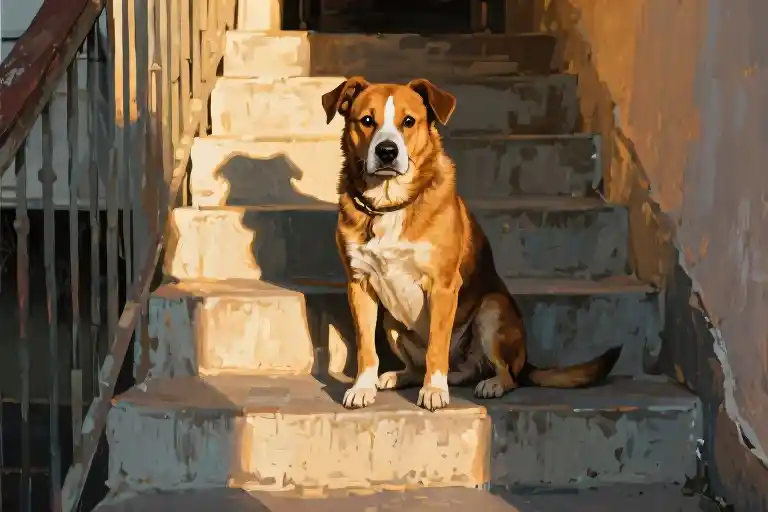The scent of pine resin clung to my fingers as I shimmied down the rough bark of the evergreen tree, my knees scraped and my heart pounding with the thrill of having touched the sky. At eight years old, my body was an adventure machine—legs that could outrun boys twice my size, arms strong enough to hoist me up to where the wind made the branches sway like ocean waves. Back then, hunger was an afterthought solved by plucking a sun-warmed apple mid-chase, its juice running down my chin as I kept playing tag until the fireflies came out.
Evenings meant collapsing into the couch cushions next to Dad, his sweater sleeve soft against my cheek as Tim Allen’s laugh track filled our living room. I’d press my nose into his arm, breathing in the safe, familiar smell of laundry detergent and the faintest hint of motor oil from his workshop. Thirty years haven’t faded that memory—the way my child’s body fit perfectly against his, how warmth radiated between us like shared sunlight.
My body was my best friend—until the world taught me to hate it.
The shift happened so gradually I didn’t notice the theft. Maybe it began when I traded bike rides for book reports, or when my hips started curving in ways that made shop clerks eye me differently. By seventh grade, I’d learned that my thighs made whisper sounds when they rubbed together in gym shorts, a phenomenon the boys found hilarious. That same year, I watched Titanic three times, mesmerized by Rose’s beauty but hyperaware of the theater gossip about Kate Winslet’s ‘unfilmable’ figure—a body smaller than mine would ever be.
Magazines at the grocery checkout screamed about flattening stomachs and shrinking thighs, their headlines etching themselves into my brain as I helped Mom unload our cart. At home, Dad came back from work quieter than usual after losing a promotion; later, I’d overhear Mom say the boss had mocked his weight. That night I stared at my reflection, tracing the similarities between my round face and his. The message was clear: bodies like ours were problems to be solved.
So I tried solving mine. Grilled chicken lunches, half-portioned dinners, the dizzy euphoria when the scale numbers dipped. ‘You look amazing!’ coworkers would say, their approval a drug I craved. Then the weight would creep back, and with it, the shame—thicker each time, until I stopped trying altogether. My body became luggage I grudgingly carried around, an inconvenient vessel for the mind people actually valued.
For years, I vacillated between neglect and punishment—wearing whatever stretchy fabrics would hide me, ignoring hunger until it became nausea, then eating past discomfort. Doctors clicked their tongues over my charts while ignoring my actual symptoms. Airplane seats dug into my hips, amusement park safety bars wouldn’t latch, and dressing rooms became battlefields where I’d mutter, ‘You can’t shine a turd’ at the mirror.
The surgery was supposed to be my redemption. Ninety pounds melted away, and with it, some physical discomforts—but mostly, I gained society’s approval. ‘You must feel so much better!’ people assumed, their eyes scanning my newly smaller frame. Their praise felt like absolution until pregnancy hormones and survival hunger brought the weight back. This time, the silence was louder than any criticism.
What saved me wasn’t another diet or procedure, but a stumbled-upon Instagram post of a woman my size belly laughing in a bikini, her stretch marks on display like tiger stripes. In that moment, something cracked open inside me. I fell down a rabbit hole of fat liberation hashtags and found my people—women who spoke of ‘body neutrality’ before loving themselves, who shared scripts for demanding medical care without weight lectures. Slowly, I began untangling decades of conditioning.
Now when I shower, I thank my arms for carrying groceries and my belly for growing five humans. At the pool last week, my daughter pressed her small hand against my swimsuit-clad stomach and declared it her favorite pillow. It’s not that my body changed—the world still has the same narrow seats and cruel assumptions—but I’ve learned to fight for my right to exist within it. Not as a problem to be solved, but as a person who runs, climbs, and loves fiercely in a body that’s weathered storms and still knows joy.
That child who climbed trees still lives in me. Some days I can even hear her laughing.
The Freedom of a Child’s Body
The scent of pine resin still lingers in my memory—sticky and sharp on my palms after scaling the evergreen tree behind Jenny’s house. I’d climb until the branches grew thin, swaying with me in the wind like nature’s own rollercoaster. From that vantage point, the world seemed made for discovery: rooftops became stepping stones, the apple tree’s canopy transformed into a secret fort where we’d bite into stolen fruit, juice running down our chins as we caught our breath between games of tag.
Our bodies were never a question back then. They were simply the vehicles for joy—strong legs that carried us through sprinklers, arms that could pull us up to the highest tree limb, bellies that ached from laughter rather than scrutiny. Hunger meant grabbing an apple mid-run, thirst was quenched by gulping from the garden hose. There was no calculation, only instinct.
Evenings often ended curled against my father’s side, his sweater soft against my cheek as we watched TV. His arms—warm and solid—created a harbor where nothing could touch me. Thirty years haven’t faded that sensation; I can still feel the steady rise and fall of his breathing, the way his chuckle vibrated through me when Tim Allen did something ridiculous on screen. My body knew safety then in ways my mind couldn’t yet articulate.
We measured our worth in scraped knees and firefly catches, in how high we could swing before jumping into piles of leaves. The concept of ‘too much’ didn’t exist—not for our energy, not for our laughter, certainly not for the space our bodies occupied. When did running stop feeling like flying? When did climbing become ‘unladylike’ rather than an adventure? The shift happened so gradually I didn’t notice the cage being built around me until I was already trapped inside.
Those early years gifted me something irreplaceable: the knowledge that my body was never the problem. The world’s scissors came later, snipping away at that certainty until all that remained were jagged edges of doubt. But the blueprint of freedom remains—in the memory of pine-scented hands, in the ghost sensation of my father’s arm around my shoulders, in the understanding that the child who moved through the world with unselfconscious joy still exists beneath layers of societal expectations. She’s the compass needle pointing me back home.
The World’s Scissors: How Society Cut Me Off From Myself
The shift happened so gradually I didn’t notice the scissors snipping away at my connection to myself. One day I was climbing trees with pine-scented hands, the next I was standing in a dressing room staring at a pair of jeans that wouldn’t button, hearing my mother’s offhand comment about ‘watching my portions’ echo in my head.
Television taught me the rules first. When the ‘Fat Monica’ flashbacks aired on Friends, my eighth-grade classmates giggled at the sight gag of a larger body in a wig. Nobody questioned why adult Monica’s worth was tied to her teenage size. At the movie theater, I absorbed the cultural dissonance—Kate Winslet’s luminous beauty in Titanic contrasted with radio hosts debating whether she was ‘too fat to play a romantic lead.’ My fingers pressed against my own soft stomach in the dark, measuring the gap between what was celebrated onscreen and what lived beneath my sweater.
The grocery store checkout line became my weekly shame seminar. While my mom unloaded vegetables onto the conveyor belt, my eyes would catch the magazine headlines screaming at me: ‘Drop 2 Sizes by Summer!’ ‘Banish Your Muffin Top Forever!’ The message was clear—my body wasn’t just changing, it was wrong.
Then the scissors cut deeper. Dad came home quieter than usual one evening, the kind of quiet that made my brother and me exchange worried looks across the dinner table. Later, I overheard Mom whispering about the promotion he didn’t get, about the boss who’d joked about ‘needing a wider office door’ for him. When she suggested he ‘get serious about the gym,’ I stopped chewing mid-bite. The realization hit like a stomach punch—if the world judged my strong, capable father for his weight, what did it think of me?
School hallways became minefields. Girls compared thigh gaps while changing for PE, their eyes flicking toward my legs. A boy I liked mimed being crushed when I accidentally brushed past him in the cafeteria. The laughter that followed wasn’t just about that moment—it confirmed what pop culture had been teaching me: taking up space was a moral failing.
I started carrying myself differently. Shoulders hunched forward to minimize my silhouette. Breath held in group photos to flatten my stomach temporarily. The girl who once raced through backyards now calculated the calories in every apple before biting into it. My body wasn’t mine anymore—it was a problem to solve, a math equation where the numbers never added up right.
The cruelest cut came from within. Lying awake at night, I’d replay the day’s interactions like courtroom evidence: Did the cashier smile at me the way she did at thinner customers? Was I offered fewer samples at the bakery? Every glance became a potential indictment. Without realizing it, I’d internalized the scissors—and started cutting myself down before anyone else could.
Looking back, I recognize the exact moment my body stopped being my home and became a house I was constantly trying to renovate. The tragedy wasn’t just the external judgments, but how thoroughly I believed them. Those scissors didn’t just separate me from my childhood joy—they severed my ability to see myself as whole.
Weight Loss Surgery: The Promise and the Lie
The day I stepped on the scale after my weight loss surgery and saw the numbers drop by 90 pounds, I felt like I’d won some unspoken competition. Friends and family showered me with compliments I hadn’t heard in years—”You look amazing!” “What willpower!” Their pride wrapped around me like a new outfit that actually fit. For the first time in decades, I believed I might finally belong in a world that had always measured my worth by the space I occupied.
But here’s what they don’t tell you about weight loss surgery—it comes with its own secret curriculum. I learned that my new stomach pouch couldn’t handle the emotional weight of existing in a body that society still viewed as a work in progress. The rules were relentless: protein first, no drinking with meals, chew each bite thirty times. I became a walking algorithm, measuring my success in grams and milliliters rather than joy or comfort.
Four months post-op, against medical advice, I discovered I was pregnant. My body, still healing from being radically altered, now had to nurture new life. The irony wasn’t lost on me—here I was with half a stomach, growing a human who would need every nutrient I could provide. Pregnancy hormones loosened my surgical restrictions, allowing me to eat more than the tiny portions my altered anatomy permitted. Hunger returned with a vengeance, especially while nursing and caring for four other children. I ate—not out of weakness, but necessity.
The weight came back quietly at first, then all at once. Where there had been applause before, now there was silence. No one said “You look great” anymore. The absence of commentary spoke volumes. I could practically hear their thoughts: She had one job—keep the weight off—and couldn’t even do that right.
What stung most wasn’t the regained pounds, but the realization that people’s kindness had been conditional all along. Their approval was never about my health or happiness—it was about my compliance with a standard I didn’t get to set. I’d been given the “golden ticket” of surgical intervention and somehow still failed at the game of shrinking myself.
Medical journals will tell you that weight loss surgery “fails” for 40% of patients within five years. They rarely mention how those statistics ignore the complex realities of human bodies—pregnancy, stress, trauma, or simply the biological drive to survive. My body wasn’t betraying me; it was doing exactly what evolution designed it to do—protect me during times of physiological stress.
The greatest lie of weight loss culture isn’t that surgery is an easy fix—it’s that regaining weight represents moral failure rather than biological inevitability. I spent months berating myself for lacking willpower before understanding this truth: My body wasn’t the problem. The problem was a world that taught me to measure my value in lost pounds rather than lived experiences.
Somewhere between the silent judgment and my own shame, I began to see the surgery for what it really was—not a solution, but another stop on society’s endless carousel of body modification. The ride never ends because the goalposts keep moving. First it’s “just lose 20 pounds,” then it’s “tone up,” then it’s “maintain forever.” There’s no finish line where you finally earn the right to exist unapologetically.
What finally freed me wasn’t maintaining weight loss, but realizing I’d been chasing the wrong kind of freedom all along. True liberation didn’t come from fitting into smaller jeans—it came from rejecting the idea that my jeans had anything to do with my worth in the first place.
Awakening: Finding My People
The algorithm showed me a woman dancing. Not the polished, edited kind of dancing I’d seen in music videos, but the messy, joyous kind—her arms swinging freely, her thighs jiggling under a sequined dress, her laughter lines deepening as she spun. The caption read: “Taking up space is my birthright.
I stared at my screen, fingers hovering over the ‘like’ button. Something cracked open in my chest. For the first time in years, I saw a body that looked like mine being celebrated rather than corrected. In the comments, hundreds of women shared their own unapologetic selfies with hashtags like #EffYourBeautyStandards and #FatAndFree.
That night, I joined the All Bodies are Good Bodies Facebook group. Scrolling through posts felt like stepping into a room where everyone spoke a language I’d forgotten existed. Women shared stories of demanding—and receiving—proper medical care despite doctors’ weight bias. Others posted photos of themselves in bikinis, stretch marks on display, captioned with things like “This body grew two humans and survived my darkest days.” Most startling were the conversations about intuitive eating, where members discussed honoring hunger without guilt. I’d spent so many years either ignoring my body’s signals or punishing myself for having them.
The Tools That Changed Everything
Body Gratitude in the Shower
I started small. Each morning, as water cascaded over my shoulders, I’d name one thing my body had done for me the day before. “Thank you, arms, for carrying all those groceries upstairs when the elevator broke.” “Thank you, legs, for walking me to the park where my daughter laughed on the swings.” At first, it felt silly. Then one Tuesday, midway through thanking my hips for supporting me through five pregnancies, I started crying. The kind of crying that comes from realizing how long you’ve been at war with yourself.
When Doctors Focus Only on Weight
Armed with advice from the group, I prepared for my next physical. When my GP began with “Have you considered trying—” I interrupted gently: “I’d like us to focus on my actual symptoms today. The dizziness happens when I stand up quickly, regardless of my weight ten years ago.” The shift was subtle—she blinked, adjusted her clipboard—but she ordered the blood pressure tests I’d been requesting for years. Later, I’d learn about studies showing heavier patients receive less diagnostic care; that moment taught me advocacy could bridge the gap.
What surprised me most wasn’t just learning to defend myself—it was discovering how many others were fighting the same battles. We traded tips: which clothing stores carried quality plus-size options, how to handle airplane seat discrimination, even the best positions for plus-size sex. The more we shared, the more the shame lost its power. My body wasn’t a problem to solve; it was a home to care for, a story still being written.
Some mornings, I still wake up reaching for that old self-loathing like a familiar, tattered robe. But now I know where to find my people—the ones who’ll remind me that my worth isn’t measured in inches or pounds, but in how fully I inhabit this skin I’m in.
Advocacy and Legacy
The first time I stood in front of my colleagues to lead the fatphobia awareness training I’d designed, my palms left damp streaks on the printed materials. For years, I’d been the one shrinking in conference room chairs that dug into my thighs, laughing awkwardly when someone joked about ‘fitting into those jeans someday.’ Now I was asking HR to order larger chairs before the session, my voice steady as I explained why this mattered.
What surprised me wasn’t the resistance—though there was some—but how many people leaned forward when I shared the Harvard implicit bias test results showing 85% of healthcare providers prefer thinner patients. A normally quiet radiologist described turning away larger patients because ‘the machines aren’t built for them.’ Our receptionist cried recalling how she’d scheduled unnecessary weight-loss consultations for plus-size patients. We ended up creating a task force to audit our clinic’s accessibility, from wider exam tables to blood pressure cuffs that fit all arms.
This wasn’t about making people comfortable with my body. It was about dismantling systems that told us some bodies deserved less space, less care, less joy. When the airline finally refunded my second seat purchase after months of emails citing Department of Transportation policies, I didn’t feel victorious—just tired that fighting for basic dignity required becoming an accidental expert in aviation regulations.
The real revolution happened in quieter moments. Like when my daughter pressed her warm cheek against my stomach during ‘magical tummy time,’ her childish honesty slicing through decades of shame. ‘Your belly’s so soft, Mommy. Like marshmallow clouds.’ In her eyes, my body wasn’t something to apologize for but a source of comfort. She’d never seen the before-and-after surgery photos hidden in my closet, the ones I used to study like failed test papers.
At the community pool last summer, I watched her splash in her ruffled swimsuit, completely unconcerned with how the water made the fabric cling. A group of teenage girls nearby kept tugging at their bikini bottoms, their laughter sharp with self-consciousness. I wanted to tell them what I now tell my daughter when she asks why my arms wiggle: ‘Because they’re good at hugging, and that’s what matters.’
This is the legacy I’m building—not through grand gestures but daily acts of rebellion. Wearing shorts that show my thigh dimples. Asking restaurants for armless chairs without embarrassment. Letting my children see me dance even when my belly jiggles. The world will try to teach them otherwise, but in our home, we measure bodies by how well they let us live, not how little space they take up.
When my daughter brings me her stuffed animals to ‘fix’ with my sewing kit, I show her how the stitches work. ‘See how the thread holds everything together?’ I say. ‘Your body is like that—not perfect, but strong and good at healing.’ She nods seriously, already knowing this truth in her bones. I pray she never unlearns it.
The afternoon sun casts diamond reflections across the pool’s surface as my daughter’s laughter rings louder than the splashing water. My bright blue swimsuit clings to skin that’s been stretched by five pregnancies, scarred by C-sections, and softened by years of weight fluctuations. There was a time when I would have wrapped myself in a towel, hiding these folds and marks from the world—but today, I let the sunlight touch every inch without apology.
My youngest climbs onto my lap, her wet curls dripping down my thighs. “Mommy, your belly makes the best slide!” she declares before gleefully pushing off my stomach into the water. The other parents glance over with smiles, but no one stares at my jiggling arms or the way my thighs spread across the pool chair. Or if they do, I no longer inventory their glances like evidence in a trial against my worth.
This is what freedom feels like—not the absence of a judging world, but the quiet realization that their judgments no longer hold power over how I exist in my skin. My body bobs effortlessly in the water, buoyant and unselfconscious, just as it did when I was eight years old climbing that pine tree behind our house. The decades between then and now hold so much noise—diet plans, shame-filled dressing room mirrors, the congratulatory comments after weight loss surgery that stung more than the incisions. All those years I spent believing my body was something to fix, when really, it was the world’s narrow expectations that needed mending.
Back home, my husband meets us at the door with towels. His eyes trace the water droplets rolling down my collarbone, not with appraisal but appreciation. “You look beautiful,” he says, and for the first time in twenty years, I don’t reflexively deflect the compliment. I catch our reflection in the hallway mirror—my damp hair frizzing wildly, my swimsuit cutting into soft flesh, his arm around my untoned waist—and think: This is what love looks like when it’s not filtered through society’s measuring tape.
At bedtime, my five-year-old presses her warm cheek against my stomach during our “magical tummy time” ritual. “Your belly is so cozy,” she murmurs, her small hand patting the very skin I once hated with such ferocity. In this moment, I understand that the most radical act of body positivity isn’t just learning to love myself—it’s creating a world where my daughter never has to unlearn her innate self-acceptance.
The journey from self-loathing to this quiet contentment wasn’t linear. There are still days when old insecurities whisper, when airplane seats feel too narrow or doctors focus on my BMI instead of my symptoms. But the difference now is this: I no longer mistake society’s limitations for my personal failures. My worth was never stored in the numbers on a scale or the tags in my clothes—it was here all along, in these arms that hold my children, these legs that carry me through life, this stomach that nurtured five beating hearts.
My body is a good body. Not because it’s perfect or small or finally “under control,” but because it’s mine—scarred and strong and gloriously alive. My daughter’s body is a good body, whether it grows to look like mine or charts its own course. And yours? However it moves through this world, whatever stories its folds and marks and angles tell—it’s good too. No conditions, no exceptions, no fine print. Just three words to carry with you like a talisman: You. Are. Enough.





